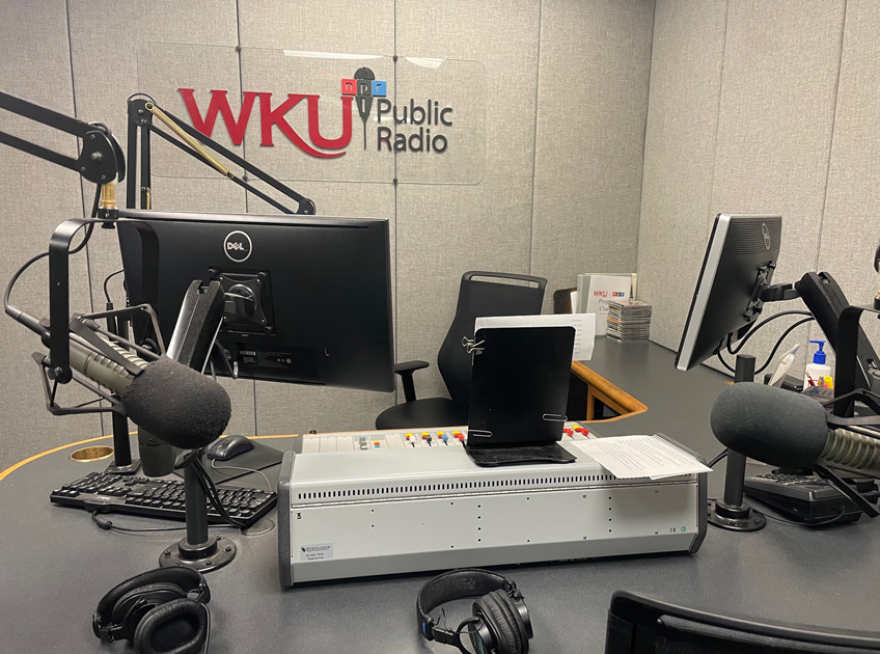Public radio and television stations across the country have been left with a big question: what happens to my station now that Congress has ended all federal funding for public broadcasting?
Republicans have for years threatened to defund the Corporation for Public Broadcasting, but those efforts never passed both chambers of Congress–until now. The U.S. House of Representatives cast the final vote last week rescinding $1.1 billion in public support for CPB, which supports NPR, PBS, and member stations across the country. The money cut by House Republicans was previously allocated by Congress for the upcoming two federal fiscal years.
The leaders of public media organizations are now working to figure out what the future holds. One of them is Jordan Basham, the interim executive director of WKU Public Media, which includes both WKU Public Radio and WKU PBS. (WKU Public Media is the only dual radio/TV public broadcaster in Kentucky.)
In an interview recorded this week with WKU Public Radio, Basham was asked what the future holds for the operation following the loss of federal funding.
“I don’t know. That is the most honest answer I can give you,” he said. “It is such a range. We’re at risk of shutting down, and that’s the truth. We’re at risk of losing people who are in jobs today. We’re at risk of losing one of my favorite things about our operation, and that’s the time we get to spend preparing the next generation of professionals, the students we work with. We have 40 part-time positions that are staffed by students that put in, last year, over 20,000 hours of paid labor. And all of that was paid for by the Corporation for Public Broadcasting’s grants that they issue to us. And that money is gone.”Michael J. Collins, the local Morning Edition host and a reporter at WKU Public Radio, said while he’s trying to remain positive, he’s troubled by the effects he says the recent Congressional vote will have on sparsely-populated areas, like much of the region covered by his station.
“The effect of losing smaller, rural stations across the country will be felt long after those who voted on the rescission are out of power. Communities will find it harder to connect with each other. Children will turn to entertainment that is neither educational nor compassionate. Politicians will have an easier time skirting responsibility,” Collins said.
Like other university-based public broadcasters, WKU Public Media has largely relied on three streams of funding sources: federal support administered through CPB, funding provided by the host university, and financial contributions made by community members through efforts like the ubiquitous public media pledge drives.
Despite that diversity of funding sources, Basham made no illusion about the magnitude of losing CPB support.
“Between radio and television combined, we have several grants we receive. They add up to right about $2.5 million over two years. For one year, for television, it’s roughly $864,000, and that’s split up between a couple of grants. One of them is specifically to support rural broadcasting coverage. On the radio side, it’s right at about $260,000. Again, a large portion of that is to help serve a rural audience.”
Basham said WKU Public Radio is gearing up for an “emergency fund drive” aimed at rallying listener support for the station. “We have to turn to them and figure out what type of operation, from how we staff, to the areas we cover, to the programming we carry–what’s sustainable,” he said.
The head of WKU Public Media made clear he was under no illusions that the public could make up for the totality of federal funding losses that became reality once Congress clawed back its previously appropriated support for CPB.
“I don’t want to scare people with that $2.5 million number,” Basham said. “I don’t believe we can set a $2.5 million goal, because that’s a hole that’s too big to fill. What we have to do is bridge the gap and that’s a much smaller number. We’ve started to reach out to members of our community who are already donors. We’re creating a community matching fund. You’ve heard us talk on the air before about a matching gift that was given by (someone) to help us spark a reason or an excuse for people to pick up the phone or log on online.”
“But that’s not what this is,” Basham explained. “This is an opportunity for everybody in the community, whether you can help us out by matching the first dollar someone else gives, or $100,000. We’re opening it up so that it’s the whole community together. Public media is for everyone and so is the community matching fund we’re going to start.” Despite the uncertainty surrounding the future of WKU Public Radio, and public media in general, Collins said he isn’t giving up hope.
“I’m going to keep talking about the news even if I have to do it through a tin can phone,” he said. “Those who attack public journalism fail to understand that it has never been about the money. I grew up through the 2000s hearing about the imminent collapse of the journalism industry, and I still chose this above all else. We’re stretched thin already and this will only make things worse. But this work has always been about our listeners, and the listeners are truly what make public broadcasting what it is.”
Note: This story was written by WKU Public Radio News Director Kevin Willis. It was edited by WKU Public Radio host/reporter Derek Parham. No station or university official reviewed this story before it was posted publicly.

